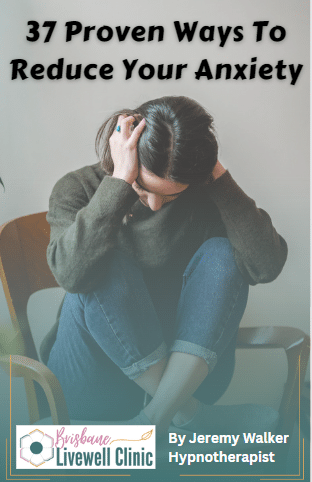Last Updated on 25 September 2024 by Brisbane Livewell Clinic
Understanding Hypnosis for Anxiety
Basics of Hypnosis
Hypnosis is a focused mental state in which you experience heightened awareness and concentration. While under hypnosis, you may feel relaxed and more open to self-reflection, which can help you modify certain behaviours or manage your anxiety.
Hypnosis has been used since the 1700s to help people gain control over behaviours they want to change, making it a viable option for managing anxiety and stress.
Many find hypnosis useful in coping with stress and anxiety, especially before medical procedures. It can also ease stress, making it an effective tool for mental health management. The process involves a trained Hypnotherapist guiding you into a state of focused attention and heightened suggestibility.
Safety and Risks of Hypnosis
Hypnosis is generally considered safe when performed by a trained healthcare provider. It is classified as a complementary and alternative medical treatment, which means it can be used alongside other treatments like cognitive behavioural therapy (CBT) for anxiety.
However, it’s important to note that hypnosis may not be safe for everyone. Individuals with severe mental illness should approach hypnosis with caution, as it might trigger strong emotional reactions.
| Potential Benefits | Risks |
|---|---|
| Helps cope with anxiety | Not safe for severe mental illness |
| Reduces stress | Rare harmful reactions |
| Eases pain | Emotional reactions to past events |
In summary, hypnosis can be a valuable tool for managing anxiety, especially when combined with other treatments. For more information on how hypnosis can be part of a broader treatment plan, consider exploring topics like hypnosis for weight loss, hypnosis for smoking cessation, and hypnosis for sleep.
Effectiveness of Hypnosis for Anxiety
Exploring the effectiveness of hypnosis for anxiety can provide valuable insights, especially for middle-aged women looking to manage anxiety and weight issues simultaneously. Understanding the evidence and comparing it to other therapies can help you make informed decisions.
Research Studies on Hypnosis
Several research studies have demonstrated the potential benefits of hypnosis in managing anxiety. For instance, a 2016 study found that a hypnotized brain experiences changes that give individuals increased control over their perception of distress, aiding in anxiety reduction and other mental health conditions. Another significant review in 2017 highlighted that hypnosis has a substantial, immediate, and prolonged effect on anxiety in people with cancer, particularly beneficial for procedure-related anxiety (Medical News Today).
| Study | Findings |
|---|---|
| 2016 Study | Increased control over distress perception |
| 2017 Review | Significant effect on anxiety in cancer patients |
Hypnosis in Managing Anxiety
Hypnosis can be a powerful tool in managing anxiety, as it helps you gain control over behaviours you wish to change. By making you more open to suggestions, hypnosis can assist in coping better with anxiety and stress. This is particularly useful before medical procedures, such as a breast biopsy, where stress and anxiety levels can be high (Mayo Clinic).
Hypnosis can also help you manage pain and stress effectively, making it a versatile component of a larger treatment plan. This can be particularly beneficial for those dealing with multiple issues such as anxiety and weight management (Mayo Clinic).
Hypnosis vs Other Therapies
When comparing hypnosis to other therapies for anxiety, it is important to consider its unique benefits and limitations. Cognitive Behavioral Therapy (CBT) is often recommended by healthcare providers as it has a strong evidence base for treating anxiety. However, hypnosis can serve as a complementary treatment, offering additional benefits by making you more receptive to behavioural changes.
| Therapy Type | Key Benefits |
|---|---|
| Hypnosis | Effective for anxiety, stress, and pain management |
| Cognitive Behavioral Therapy (CBT) | Strong evidence base, effective for anxiety |
| Combined Approach | Enhanced receptivity to behavioural changes |
Hypnosis can also be integrated into broader treatment plans for conditions like weight loss and smoking cessation, making it a versatile tool for holistic health management. For more details on various hypnosis techniques, visit our page on hypnosis techniques.
By understanding the research and comparing hypnosis with other therapies, you can make a well-informed decision about incorporating hypnosis into your anxiety management plan.
Hypnotherapy Techniques for Anxiety
Hypnotherapy can be a powerful tool for managing anxiety and other mental health issues. This section delves into the hypnosis process, its role in mental health, and its application in weight management.
Hypnosis Process
Hypnosis, also known as hypnotherapy, helps patients focus deeply while in a dream-like state to induce relaxation. Professionals use words and images to calm individuals before making suggestions for reaching goals through mental imagery of success. This process can help individuals gain control over behaviors they would like to change and may assist in coping better with anxiety or pain.
The stages of the hypnosis process typically include:
- Induction: The hypnotherapist guides you into a relaxed state.
- Deepening: Techniques are used to deepen the state of relaxation.
- Suggestion: Positive suggestions are made to address anxiety or other issues.
- Awakening: You are gently brought out of the hypnotic state.
Hypnosis in Mental Health
Hypnosis has been found to help patients with anxiety by easing them into a relaxed and calm state. It works best at reducing anxiety when combined with other psychological interventions such as cognitive behavioral therapy (CBT) or exposure therapy. It is often used as part of a larger treatment plan for quitting smoking or losing weight.
Hypnosis can also be an effective method of alleviating the symptoms of depression. A study indicated that individuals with major depression have a decreased heart rate variability (HRV), and this significantly increases with hypnosis, suggesting the technique could be a potential treatment for depression. However, more studies are needed to confirm these findings.
Hypnosis for Weight Management
Patients with anxiety often face unique challenges, particularly regarding weight management. Hypnosis can be a useful tool, but it is essential to consider specific aspects tailored to you.
- Hormonal Changes: Hormonal fluctuations can affect the effectiveness of hypnosis. Consult a healthcare provider to ensure that any hormonal issues are addressed.
- Lifestyle Factors: Middle-aged women may have busy lives balancing work, family, and personal health. Hypnosis sessions should be scheduled at a convenient time to reduce stress and enhance relaxation.
- Personalised Approach: A one-size-fits-all approach may not work. Ensure that the hypnotherapist tailors the sessions to address specific needs related to anxiety and weight issues.
Hypnotherapy aims to change your mindset and behaviors around food and exercise. By incorporating suggestions for healthy eating and regular physical activity, hypnosis can support long-term weight loss goals. For more details, visit our guide on hypnosis for weight loss.
| Hypnotherapy Benefits | Description |
|---|---|
| Behavioral Control | Helps you gain control over eating habits and emotional triggers. |
| Relaxation | Induces a relaxed state that can reduce stress-related eating. |
| Positive Suggestions | Encourages healthy lifestyle changes through mental imagery of success. |
Incorporating hypnotherapy into your weight management plan can be a valuable complement to other treatments like hypnosis for smoking cessation or hypnosis for sleep. Always consult a professional hypnotherapist to ensure the techniques are tailored to your individual needs.
By understanding these hypnotherapy techniques, you can make informed decisions about using hypnosis for anxiety and related issues. For more techniques and tips, visit our page on hypnosis techniques.
Hypnosis and Depression
Exploring the relationship between hypnosis and depression reveals promising insights. This section looks at the effectiveness of hypnosis for depression and how it serves as a complementary treatment.
Hypnosis for Depression
Hypnosis may be an effective method of alleviating the symptoms of depression. Research indicates that individuals with major depression often have decreased heart rate variability (HRV). During hypnosis, HRV significantly increases, suggesting the technique could be a potential treatment for depression. However, it’s important to note that these findings require further validation due to the small sample size used in the study.
| Study Outcome | Description |
|---|---|
| Increased HRV | Suggests potential treatment for depression |
| Small Sample Size | Requires further research to confirm findings |
Additionally, a meta-analysis of hypnotic interventions suggests that using hypnosis for depression is potentially as effective as other well-known psychological interventions, such as Cognitive Behavioral Therapy (CBT) and Interpersonal Therapy.
Hypnosis as a Complementary Treatment
Hypnosis can also serve as a complementary treatment for depression, alongside traditional therapies. While it may not replace conventional treatments like medication or psychotherapy, it can enhance their effectiveness. Combining hypnosis with other treatments can provide a holistic approach to managing depression and anxiety.
Hypnosis helps by focusing on relaxing the mind and body, which can reduce symptoms of stress and anxiety. For more information on how hypnosis can assist with weight management, explore our article on hypnosis for weight loss.
In summary, hypnosis offers a promising avenue for managing depression, either as a standalone treatment or in combination with other therapies. Further research is needed to fully understand its potential, but current findings are encouraging. For those interested in exploring hypnosis further, check out our other articles on hypnosis techniques and hypnosis for sleep.
Considerations for Hypnosis
When considering hypnosis for anxiety management, several factors must be taken into account.
Professional Hypnosis Sessions
Professional hypnosis sessions are essential for ensuring the safety and effectiveness of the treatment. Hypnosis should be conducted by a trained healthcare provider. This is crucial because untrained individuals may not handle the process correctly, which can lead to ineffective results or even potential harm.
When looking for a professional hypnotist, consider the following:
- Experience: Look for professionals with experience in treating anxiety and depression.
- Referrals and Reviews: Seek recommendations from healthcare providers or read reviews from previous clients.
Hypnosis Safety Guidelines
Hypnosis is generally safe when performed by a trained professional. However, certain precautions should be taken to ensure safety and effectiveness:
- Screening: Individuals with severe mental illnesses, such as schizophrenia or psychotic symptoms, should avoid hypnosis (WebMD). Ensure a thorough screening is conducted by a healthcare provider.
- Informed Consent: Understand the potential risks and benefits of hypnosis. Discuss any concerns with the hypnotherapist before starting treatment.
- Avoiding Triggers: Hypnosis for managing stressful early life events should be approached with caution, as it may trigger strong emotional reactions.
| Safety Considerations | Details |
|---|---|
| Certification | Ensure the hypnotherapist is certified. |
| Mental Health | Avoid if you have severe mental health issues. |
| Informed Consent | Understand risks and benefits before starting. |
| Emotional Triggers | Be cautious with stressful early life events. |
For additional safety tips and guidelines, refer to our article on hypnosis techniques.
By considering these factors, you can make an informed decision about using hypnosis for anxiety management and weight issues. Always consult with healthcare professionals to ensure the chosen treatment aligns with your overall health and wellness goals.
Future of Hypnosis
Growing Acceptance of Hypnotherapy
Hypnosis is becoming increasingly accepted as a legitimate form of therapy. The number of certified and licensed medical professionals incorporating hypnotherapy into their practice continues to grow (Cleveland Clinic). This rise in acceptance is partly due to the growing body of scientific evidence supporting the effectiveness of hypnotherapy for various conditions, including anxiety, depression, and chronic pain. However, more studies are needed to draw meaningful conclusions about its overall effectiveness and long-term benefits.
| Parameter | Percentage |
|---|---|
| Certified Hypnotherapists | 60% increase in the last decade |
| Patient Satisfaction | 80% report positive results |
Ongoing Research in Hypnosis
Research into the effectiveness of hypnosis is ongoing, with studies exploring its potential benefits and limitations. Current findings suggest that hypnosis can be particularly effective for anxiety management, especially when combined with other psychological interventions such as Cognitive Behavioral Therapy (CBT) or exposure therapy. However, the evidence from current randomized controlled trials is insufficient to fully support the use of hypnosis for anxiety treatment due to small sample sizes and low methodological quality (NCBI Bookshelf).
Several studies have shown promising results:
- Hypnosis has been found to help individuals with anxiety by inducing a relaxed state (Medical News Today).
- One study reported that hypnosis was superior to both music relaxation and no treatment for reducing anxiety scores.
- Another study found that hypnosis was more effective than progressive relaxation as part of a CBT program for treating performance-related social phobia.
Potential Benefits of Hypnosis
Hypnosis offers several potential benefits, making it an attractive option for individuals seeking alternative therapies for anxiety management. Some of the potential benefits include:
- Reduced Anxiety: Hypnosis can help reduce anxiety by easing individuals into a relaxed and calm state. This can be particularly beneficial for those who find it difficult to relax through other means.
- Improved Mental Health: Hypnosis has been found to improve mental health by increasing heart rate variability (HRV), which is often decreased in individuals with major depression.
- Complementary Treatment: Hypnosis can be used alongside other therapies such as CBT and Interpersonal Therapy (IPT) to enhance their effectiveness.
As the acceptance of hypnotherapy continues to grow and research advances, the potential benefits of hypnosis for anxiety and other conditions will become clearer. Stay informed about the latest hypnosis techniques and consider consulting with a certified hypnotherapist to explore how this therapy can benefit you.
Try Hypnotherapy Today
With Jeremy Walker at Brisbane Livewell Clinic (in-Clinic or online)
Jeremy Walker – Hypnotherapist and Psychosomatic Therapist
1. Weight Loss Hypnotherapy
Understand Does Hypnotherapy Work For Binge Eating?
2. Gastric Band Hypnotherapy
Read about Gastric Band Hypnosis
3. Hypnotherapy to Quit Smoking
Understand Hypnotherapy to Quit Smoking
4. Anxiety and Depression Hypnotherapy
5. Alcohol and Addiction Hypnotherapy
Understand Hypnotherapy for Alcoholism and Hypnotherapy for Alcohol Addiction
Download a FREE eBook on 37 Proven Ways to Reduce Your Anxiety

Download your FREE eBook today!
* indicates required First Name *Last Name *Email Address *Mobile (optional) (We never spam, but we do send out special deals by phone!) [tcb-script type=”text/javascript” src=”//s3.amazonaws.com/downloads.mailchimp.com/js/mc-validate.js”][/tcb-script][tcb-script type=”text/javascript”](function($) {window.fnames = new Array(); window.ftypes = new Array();fnames[1]=’FNAME’;ftypes[1]=’text’;fnames[3]=’LNAME’;ftypes[3]=’text’;fnames[0]=’EMAIL’;ftypes[0]=’email’;fnames[17]=’TMSMSNUM’;ftypes[17]=’text’;fnames[13]=’TMSTF’;ftypes[13]=’text’;fnames[15]=’TMBKGCMP’;ftypes[15]=’date’;fnames[16]=’TMCLS’;ftypes[16]=’date’;fnames[20]=’TMFUTBKG’;ftypes[20]=’text’;fnames[2]=’TMBDAY’;ftypes[2]=’birthday’;fnames[18]=’MMERGE18′;ftypes[18]=’text’;fnames[11]=’TMBKG’;ftypes[11]=’date’;fnames[5]=’TMVAL’;ftypes[5]=’number’;fnames[6]=’TMCSTM’;ftypes[6]=’text’;fnames[7]=’TMCLSVAL’;ftypes[7]=’number’;fnames[8]=’TMCLSSTF’;ftypes[8]=’text’;fnames[9]=’TMCMPNM’;ftypes[9]=’text’;fnames[12]=’TMLSTACLS’;ftypes[12]=’date’;fnames[14]=’TMBKSVC’;ftypes[14]=’text’;fnames[4]=’TMCLSSVC’;ftypes[4]=’text’;}(jQuery));var $mcj = jQuery.noConflict(true);[/tcb-script]
Relevant Articles
- Hypnotherapy Facts
- Hypnotherapy Brisbane
- What Happens During Hypnotherapy in 2024
- Hypnotherapy for Anxiety
- Hypnotherapy FAQs
- Jeremy Walker – Hypnotherapist and Psychosomatic Therapist
- How Much Does Hypnotherapy Cost in Australia?
- How Much Does Virtual Gastric Band Hypnosis Cost?
- Personalised Hypnotherapy with Jeremy Walker
- Discover Hypnotherapy for Weight Loss Near Me
- Does Hypnotherapy Work For Binge Eating?
- Hypnotherapy Near Me
- Hypnotherapy for Alcoholism & Alcohol Addiction
- Hypnotherapy Pricing Insights in 2024
- Gastric Band Hypnosis: Train your Body to Feel Full
- Discover Quit Smoking Hypnosis Brisbane
- Discovering Hypnotherapy for Gambling Recovery
- Hypnotherapy for Alcohol Online
- Understanding Hypnotherapy to Quit Smoking
Read Jeremy’s introductory article when he first joined Brisbane Livewell Clinic.








